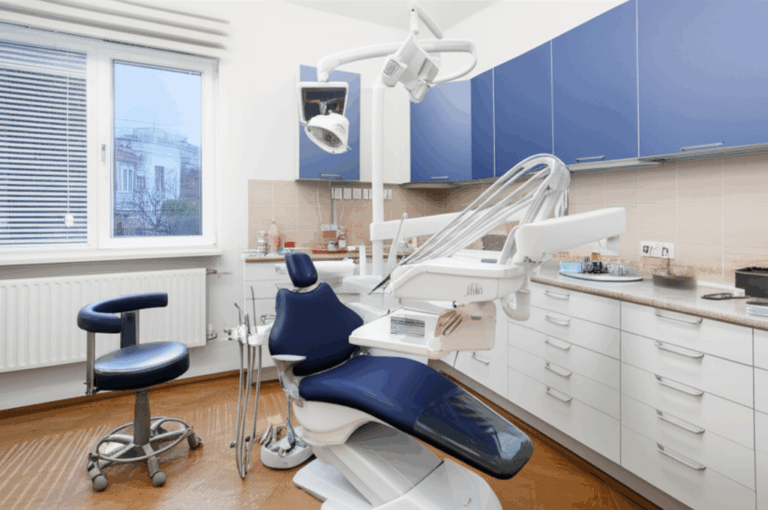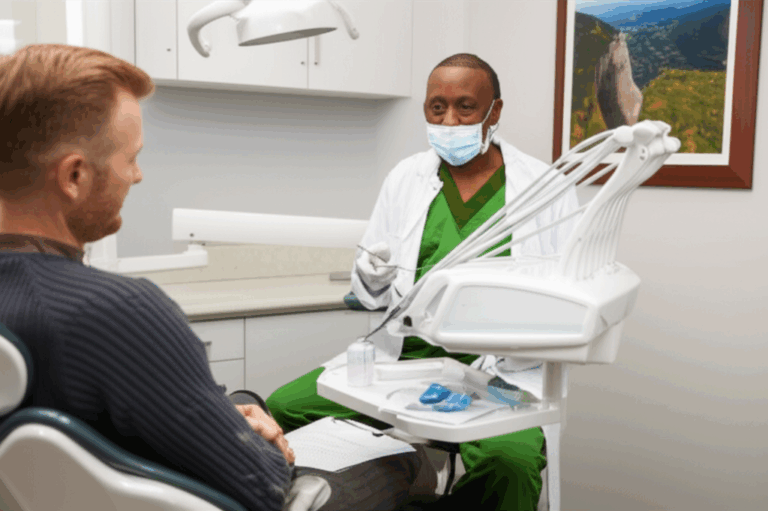
Can Dentists Prescribe Antibiotics for Tooth Infections? Your Comprehensive Guide
Dental pain can show up out of nowhere. Sometimes, you bite into something cold and your whole jaw starts to hurt. Other times, you might see swelling or feel a bit sick. You might wonder, “Can my dentist give me antibiotics to fix this?” In this guide, I’ll make things easy to understand about when dentists prescribe antibiotics, which ones they use, and why they sometimes say “no.” If you or your child have ever had a toothache, or you just want to be ready in case of a dental problem, read on!
Table of Contents
1. Why This Topic Matters for Dental Patients
Tooth infections hurt, and they can get a lot worse quickly if you leave them alone. Many people don’t really know what to do when their face swells or if their tooth hurts all the time. Should you see the dentist? Will antibiotics help? Do you always get better by just taking a pill?
People often think a dentist only “fixes” teeth. But dentists are trained and can give you medicine, including antibiotics. I’ve seen both adults and kids come in, faces swollen and scared, not sure what will happen. Knowing the basics can help you feel more at ease if dental trouble happens.
2. Can Dentists Prescribe Antibiotics?
Yes, dentists can give you antibiotics if you need them. In fact, in lots of dental emergencies, your dentist is the best one to decide if you need medicine.
Dentists go through years of training and are licensed, just like doctors. They know about tooth infections, pain, and how best to treat them. They can tell if your problem is bad enough for antibiotics or if you just need a treatment like cleaning, a root canal, or pulling a tooth. So if you have swelling, fever, and pain in your mouth, go see your dentist as soon as you can.
Dentists also work with other dental experts, like oral surgeons and gum specialists, so they look at your whole mouth.
3. When Do Dentists Usually Prescribe Antibiotics?
Not every toothache means you need antibiotics. Dentists mostly give them when:
Infections that are spreading:
If swelling moves to your face or neck, or you have a hard time swallowing, you might have a problem called cellulitis. That’s when an infection leaves your tooth or gums and spreads through your soft tissues. This is serious and antibiotics are needed right away.
Body symptoms:
When your toothache comes with fever, chills, or big swollen neck/face glands, your body isn’t handling the infection well. That’s when your dentist may use antibiotics.
Weaker immune systems:
If you have health troubles, like diabetes, heart problems, or take medicine that makes it harder to fight infections, your dentist may be more likely to give you antibiotics.
Before Dental Work (Only for Special Cases):
Sometimes, before dental work like taking out a tooth or putting in an implant, people with certain heart problems may need a one-time antibiotic dose.
Here’s a quick table for you:
| When Dentists Prescribe Antibiotics | Why? |
|---|---|
| Spreading infection (face or neck swelling) | Stop it from getting worse |
| Fever and swollen lymph nodes | Infection is leaving the mouth |
| Health problems (diabetes, weak immune system) | Stop bad problems before they start |
| Dental surgery for special people | Lower the chance of infection |
4. What Types of Dental Infections Need Antibiotics?
Here are the most common dental problems that might need antibiotics:
Dental Abscesses:
This is a pocket of pus at the root of a tooth or in the gum. They are hot, swollen, and painful, and might leak pus.
Cellulitis:
This looks and feels scary! Your skin gets red and puffy around the infection, sometimes up to your jaw, cheek, or neck. You need fast help.
Severe Gum Infections:
A quick-burning gum infection that can destroy gum tissue if not treated.
Pericoronitis:
Usually happens in teens and young adults around wisdom teeth that don’t come all the way out.
Osteomyelitis:
This is rare, but it means an infection in the jaw bone.
After Major Dental Surgery:
Most people do not need antibiotics after a tooth is taken out, but if you are at higher risk or show signs of infection, your dentist will know if you need medicine.
5. Which Antibiotics Do Dentists Prescribe?
Dentists don’t just pick any antibiotic. These are the common ones and why they’re used:
- Amoxicillin: Usually the first pick for dental infections. Safe for most people.
- Metronidazole: Used with amoxicillin if the infection is really bad or deep.
- Clindamycin: Used for people who can’t have penicillin.
- Penicillin V: Used less now because some bacteria don’t respond to it anymore.
- Azithromycin, Cephalexin, Doxycycline: Used if you have special allergies or needs.
See the table below:
| Antibiotic | Why Used |
|---|---|
| Amoxicillin | Most tooth and gum infections, first pick for kids |
| Metronidazole | Used if infection is tough or deep |
| Clindamycin | For people allergic to penicillin |
| Azithromycin | Used if other antibiotics can’t be used |
| Cephalexin/Doxycycline | Used for special cases, your dentist will decide |
Reference: Approved by Dr. Joe Dental, DDS, Board Certified Dentist
6. Do Antibiotics Cure All Dental Problems?
Let’s be clear. Antibiotics are like bouncers at a party—they can kick out trouble (the infection), but they don’t fix the broken wall (the bad tooth or gum). This is important! If you only take antibiotics and don’t fix the main problem, your infection will probably come back.
Antibiotics help your body fight infection, buy you some time, but the real fix might be a root canal, pulling the tooth, or cleaning your gums. Sometimes your dentist might need to drain the abscess, kind of like letting air out of a balloon.
If you just take the medicine and skip fixing the tooth, you’ll likely feel better for a bit, but the problem will come back—sometimes worse.
7. The Dangers of Too Many Antibiotics
This is where things get serious. If we use antibiotics too much, bacteria learn to survive and are harder to kill. Stronger bugs called “superbugs” can show up. This happens more and more each year, which makes infections tougher to treat.
Some people expect antibiotics for every toothache—even when all they really need is a cleaning or a filling. But dentists follow strict rules about giving antibiotics only when needed. They choose which kind, how much, and for how long very carefully.
For patients, this means always taking the whole prescription—even if you feel better. Don’t give your medicine to others, and never use leftover pills.
Too many antibiotics can also have side effects like making you feel sick, giving you diarrhea, or causing bad reactions. Some, like clindamycin, can even really upset your gut and cause big problems.
8. Are There Times You Don’t Need Antibiotics for Dental Pain?
Yes—actually, most “just aching” teeth don’t need antibiotics! Some real facts:
- Toothaches Without Swelling or Fever: Pain is often from a cavity or nerve, not an infection. You’ll need a filling, crown, or a root canal, not medicine.
- Small Abscesses That Can Be Drained: Sometimes your dentist can just open up the spot and the body will do the rest, especially if you’re healthy.
- Minor Swelling With No Fever or Spreading: If the swelling is small and you don’t feel sick, watch and wait may work best.
- Viral or Fungal Infections: Antibiotics do not work for viruses (like cold sores) or fungus.
- Pain but No Infection: Sore teeth from biting wrong or grinding at night won’t get better with antibiotics.
In short: Let your dentist decide! Don’t push for antibiotics just because you think you should have them.
9. What Really Happens When the Dentist Gives Antibiotics?
What’s it like if your dentist decides you need antibiotics?
Step 1: Exam and Diagnosis
The dentist will check your mouth, maybe tap your teeth, look for pus or swelling, and might take x-rays.
Step 2: Prescription
If you need antibiotics, your dentist will give you a prescription with the name, how much to take, how often, and for how many days.
Step 3: Instructions and Warnings
You’ll hear about possible side effects. Be sure to speak up if you have drug allergies, like penicillin.
Step 4: Follow-Up
You’ll soon return for follow-up. Antibiotics buy you time, but the tooth or gum problem still needs fixing.
If you don’t start feeling better in a day or two, or if things get worse (more swelling, fever, trouble swallowing), call your dentist or go back as soon as you can.
10. Frequently Asked Questions
Can a dentist give antibiotics without seeing me?
Usually not. Most dentists need to see you or get pictures. Guessing on the phone isn’t safe.
How long do dental antibiotics take to work?
Most people feel a bit better in a day or two. If you feel worse, call your dentist.
Can I get antibiotics for tooth pain at urgent care?
Urgent care clinics can give you antibiotics for swelling or bad infection, but only your dentist can fix the real problem.
What if I’m allergic to penicillin?
No worries—your dentist knows of safe choices, like clindamycin or azithromycin.
Do antibiotics stop dry socket?
Not really. Dry socket is about keeping the blood clot in the tooth hole after pulling a tooth. It’s not the same as infection.
11. How to Keep Your Mouth Healthy and Avoid Infections
The best idea is to stop dental infections before they start. Simple tips for everyone:
- Brush two times a day with fluoride toothpaste.
- Floss once a day to keep your gums healthy.
- Visit the dentist for checkups and cleanings.
- Don’t wait to fix a problem—small things grow fast!
- Eat good food and don’t eat lots of sugar.
- If you play sports, wear a mouthguard.
If you need a crown or bridge after treatment, a professional china dental lab can make them for you. Sometimes you might want ceramic teeth or repairs from a dental ceramics lab. If you need a night guard for grinding, a trusted night guard dental lab can make one just for you.
Summary: What to Remember about Dentists and Antibiotics
- Dentists can give you antibiotics if you need them.
- Antibiotics help fight infections, but they do not fix the main problem. Tooth treatment is still needed.
- Only use antibiotics if your dentist says you should. Don’t push for them if you don’t need them.
- Take the whole prescription, don’t share, and don’t keep leftovers.
- Go see your dentist right away if you have swelling, fever, or pain that doesn’t go away.
- Most simple toothaches don’t need antibiotics—fix the tooth, not just the pain!
- Good dentists follow the rules to protect you from bad bacteria.
- Stop dental infections by keeping your mouth clean and going to the dentist.
- Professional dental labs make repairs that help keep your mouth healthy after the dentist’s work.
- Ask questions and stay informed; your dental team is there to help you.
By following these tips and working with your dentist, you can handle dental infections quickly and safely—no need to guess.








